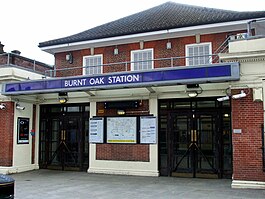Burnt Oak tube station
| Burnt Oak |
|
|---|---|
 |
|
|
Location of Burnt Oak in Greater London
|
|
| Location | Burnt Oak |
| Local authority | London Borough of Barnet |
| Managed by | London Underground |
| Number of platforms | 2 |
| Fare zone | 4 |
| London Underground annual entry and exit | |
| 2012 |
|
| 2013 |
|
| 2014 |
|
| 2015 |
|
| Railway companies | |
| Original company | London Electric Railway |
| Key dates | |
| 27 October 1924 | Opened as Burnt Oak |
| c. 1928 | Renamed Burnt Oak (Watling) |
| c. 1950 | Renamed Burnt Oak |
| Other information | |
| Lists of stations | |
| WGS84 | 51°36′10″N 0°15′50″W / 51.6028°N 0.2639°WCoordinates: 51°36′10″N 0°15′50″W / 51.6028°N 0.2639°W |
|
|
|
Burnt Oak is a London Underground station in Burnt Oak, north London, on Watling Avenue, off the A5 (the Edgware Road, originally a Roman Road known as Watling Street). The station is on the Edgware branch of the Northern line, between Edgware and Colindale stations, and in Travelcard Zone 4.
The station was designed by architect Stanley Heaps and opened as Burnt Oak (Watling) on 27 October 1924, two months after the extension of the Hampstead & Highgate Line from Hendon Central to Edgware had opened. For a while, the station was going to be named "Sheves Hill", and this name appears - crossed out with "Burnt Oak" printed on the side - on a version of the Underground map from 1924. The station was originally provided with a temporary structure before the final ticket office building was constructed in 1925. The suffix was dropped from the name about 1950.
London Buses routes 114, 204, 251, 302 and 305 and night route N5 serve the station.
View SE, towards Golders Green and central London in 1961
Island platform looking north
Island platform looking south
One of the larger roundels displaying the former suffix "for Watling"
...
Wikipedia

